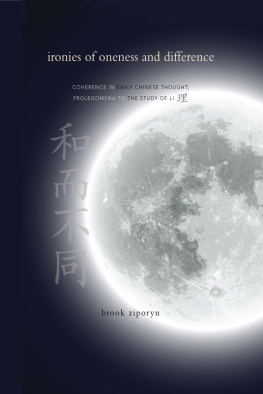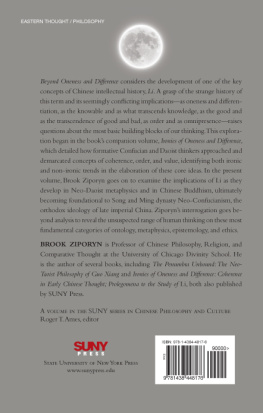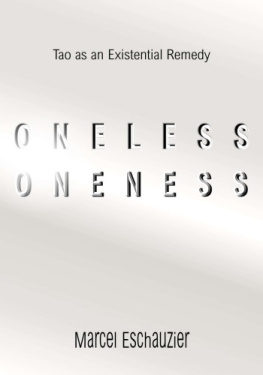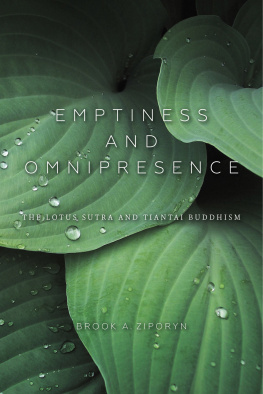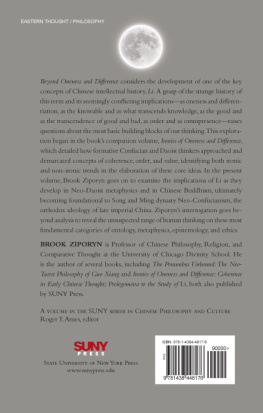Roger T. Ames, editor
IRONIES OF ONENESS AND DIFFERENCE
Coherence in Early Chinese Thought;
Prolegomena to the Study of Li
BROOK ZIPORYN
STATE UNIVERSITY OF NEW YORK PRESS
Published by
STATE UNIVERSITY OF NEW YORK PRESS, ALBANY
2012 State University of New York
All rights reserved
Printed in the United States of America
No part of this book may be used or reproduced in any manner whatsoever without written permission. No part of this book may be stored in a retrieval system or transmitted in any form or by any means including electronic, electrostatic, magnetic tape, mechanical, photocopying, recording, or otherwise without the prior permission in writing of the publisher.
For information, contact
State University of New York Press, Albany, NY
www.sunypress.edu
Production, Laurie Searl
Marketing, Anne M. Valentine
Library of Congress Cataloging-in-Publication Data
Ziporyn, Brook, 1964
Ironies of oneness and difference : coherence in early Chinese thought : prolegomena to the study of Li / Brook Ziporyn.
p. cm. (SUNY series in Chinese philosophy and culture)
Includes bibliographical references (p.) and index.
ISBN 978-1-4384-4289-1 (hardcover : alk. paper)
1. Li. 2. Philosophy, Chinese. 3. TruthCoherence theory. I. Title.
B127.L5Z57 2012
181'.11dc23
2011038254
1 0 9 8 7 6 5 4 3 2 1
ACKNOWLEDGMENTS

This book was a long time in gestation, and the process by which it came to be was especially protracted and convoluted, which means it has been sucking the life out of an unusually large number of persons and institutions for an especially long time! The parasite now takes the opportunity to express its gratitude to its hosts.
First and foremost I want to thank my students. I mean this in the most general sensestudents real and virtualbecause I remain convinced that the only real point of doing academic work of this kind is for the sake of the next generation of scholars and thinkers. As for our colleagues, our friends, our peers, they are beyond hope! And we are beyond hope for them, which is, I suppose, just as it should be. We are set in our ways, we have deep investments, emotional and otherwise, in our conclusions; at a certain age our minds start to rattle along the same old tracks, it seems. So for me the only really meaningful audience for a work of this kind is the unknown future readers, the young, the curious, the undecided, the ones who are still exploring, who have not yet declared any specific allegiance, who are trying to get a general sense of where they stand, of what can be assumed, of what the possibilities are and what the cost and payoffs are for each of these options, of how things are and have been and could be.
Among my students in the flesh, I must single out Michael Beraka and Alanna Krause for their careful technical assistance with the manuscript. But I also owe an enormous debt to the discussions with and challenges posed by all my actual students over the years, which gave shape to the lectures from which this book emerged. And even more than that, it is the very existence of these students that is the real motivation behind trying to formulate and structure a global theory of this kind at all, to bother to try to express it in a consistent and intelligible form. Nietzsche, I think, got this point very right: Whoever is fundamentally a teacher takes all things seriously only in relation to his studentsincluding even himself. So I owe them that too. Without them I would not have had the opportunity to experience that very strange but wholesomely unnatural form of consciousness: having to take oneself seriously now and then.
Looking in the other direction, at yin's debt to yang rather than yang's debt to yin, I must also thank the teachers who many years ago first really opened my eyes to the careful and systematic study of classical Chinese philosophy, above all Professor Donald Munro and Professor Xin Yiyun . The model derived from both of these exemplars in how to combine detail and overview, rigor and creativity, in a single integrated process, together with the specific insights and orientations gained in the careful study of many of the classical texts discussed in this book, continues to be my guiding lodestone, which I feel has served me enormously well over the years.
I have also had the good fortune to have many accomplished and distinguished specialists read versions of this manuscript in various stages of its growth, to whom I owe enormous gratitude both for the time and encouragement they have given me and the invaluable comments they have offered. Among the very eminent minds who have done me this honor I must first mention of course my simultaneous antipode and doppelgnger Alan Cole, who has long been for me a true knower of the tone () both musically and intellectually. Nothing has been more sustaining and stimulating for my thinking than the eternal riddle posed by our interactions: How can such total agreement and total disagreement of outlook coincide so exactly and in such a convivial and invigorating way? That must mean something. But great gratitude is also owed on this score to my much admired friends Steven Angle, Roger Ames, Michael Puett, Franklin Perkins, Robin Wang, Alan Dagovitz (Levinovitz), Michelle Molina, and Paul D'Ambrosio, all of whom have lent me the benefits of their great erudition, intelligence, sensitivity, and time to read and comment on drafts of this book, thereby greatly improving it.
Great thanks are also due to Nancy Ellegate at State University of New York Press for seeing this complicated project through over the course of its many metamorphoses, and for the free hand she was willing to allow me to get it done; that was by any standard an unusually complicated process that required considerable steadiness of hand and of vision on her part, as well as a degree of confidence in the author's judgment that has become lamentably rare among editors, a confidence I fervently hope that I have deserved.
Over the years during which this book was written I have suckled at the teat of many an institution as well. The Department of Religious Studies and the Department of Philosophy at Northwestern University have been my home for most of this time, and I have been treated exceptionally well there. It has also been my pleasure to be part of the faculty of the Department of Philosophy at the National University of Singapore, where some of the final work on this book was done. Financial support has been generously provided by a fellowship awarded by the Fulbright-Hays Foundation, and from an International and Area Studies Grant sponsored jointly by the American Council of Learned Societies, the Social Science Research Council, and the National Endowment for the Humanities. The official vote of confidence embodied therein, as well as the financial assistance, have been indispensable to the completion of this work.
Of course there are also many people to whom I owe gratitude on a more personal level, a lot of people whom I love a lot, maybe even including some already mentioned. I'm too shy, though, not to feel somewhat paralyzed and discomfited by the prospect of talking about this kind of emotional bond in public, making the customary front-of-the-book PDA feel almost like a slightly indecent actshy, or perhaps self-protective, or perhaps just old-fashioned and easily embarrassed, or superstitious in a Rumpelstiltskinny way about naming names, lest this steal from their owners the power they have over me. They know who they are, don't they? Anyway:

